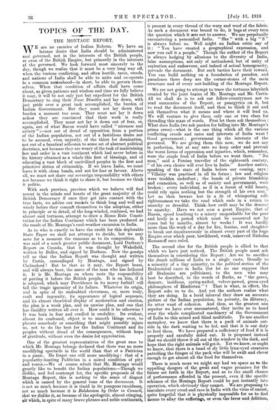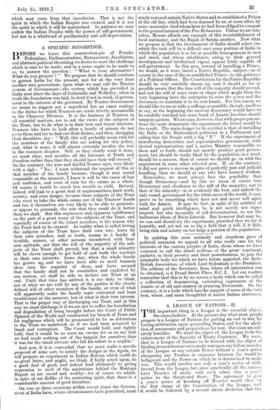TOPICS OF THE DAY.
THE MONTAGU REPORT.
WE are no enemies of Indian Reform. We have an intense desire that India should be administered and governed, not in the interests of the British people, or oven of the British Empire, but primarily in the interests of •the governed. We look forward most sincerely to the day, though we realize that it must be a very long way off, when the various conflicting, and often hostile, races, creeds, and -nations of. India shall be able to unite and co-operate in a common nationhood—in short, be able to govern them- selves. When that condition of affairs shall have come about, as given patience and wisdom and time we fully believe it may, it will be not only just but expedient for the British Democracy to sing their Nunc Dimittis and lay down, with just pride over a great task accomplished, the burden of Indian Government. But they must not lay down that burden a moment too soon. They must not lay it down unless they are convinced that their work is really accomplished. They must not lay it down out of fear, or, again, out of what Bacon would have called " niceness and satiety ";not out of dread of opposition from a portion of the Indian population, not out of a fastidious desire not to be accused, even unjustly, of the thirst for domination, not out of a fanatical adhesion to some set of abstract political doctrines, not because they are weary of the task of maintaining law and order in a vast continent which had never before in its history obtained as a whole this first of blessings, and of educating a vast block of uncivilized peoples in the krst and primitive duties of citizenship. If we leave India, we must leave it with clean hands, and not for fear or favour. Above all, we must not share our sovereign responsibility with others not because we think it right to share it, but because we think it politic.
With such provisos, provisos which we believe will find assent in the minds and hearts of the great majority of the British Democracy if once they get into contact with -the true facts, wo advise our readers to think long and well and wisely before they commit themselves to the adoption, either in principle or in detail, of the long-winded, confused, we had almost said tortuous, attempt to draw a Home Rule Consti- tution for the Indian Continent which has been produced as the result of Mr. Montagu's cool-weather excursion to India.
As to who is exactly to have the credit for this deplorable State Paper we shall not attempt to decide, but we may note for a moment the rumours as to its composition. It was said of a much greater publio document, Lord Durham's Report on Canada, that it was thought by Wakefield, written by Buller, and signed by Durham. Now the gossips tell us that the Indian Report was thought and -written by Curtis, camouflaged by Montagu, and signed by Chelmsford 1 But be that as it may, the Report bears, and will always bear, the name of the man who has fathered it. It is Mr. Montagu on whom rests the responsibility of putting it before the British people. It is on him, if it is adopted, which may Providence in its mercy forbid I will fall the tragic ignominy of its failure. Whatever its origin, and in spite of its undoubted cleverness, or, more truly, craft and ingenuity, its appearance of logical sequence, and its almost theatrical display of moderation and caution, the plan is a weak plan, and an unwise plan, and one that has timidity written all over it. How could it be otherwise ? It was born in fear and cradled in credulity. Its evident, almost its confessed, object is to smooth things over, to placate somebody or something that might possibly injure us, not to do the best for the Indian Continent and its peoples without dread of the consequences, without hope of gratitude, without even the desire for approbation.
One of the greatest representatives of the great race to which Mr. Montagu belongs declared that there was no more unedifying spectacle in the world than that of a Patrician in a panic. He forgot one still more unedifying that of a popularity-hunting Politician in a mixed condition of pity and terror.—We of course admit that Mr. Montagu would greatly like to benefit the Indian populations.—Though we dislike, and feel contempt for, the specific proposals of the Montagu Report, this is nothing to the sense of disgust which is caused by the general tone of the document. It is not so much because it is timid in its pompous tumidness, not so much because it is Bolshevism by Order in Council, _ that we dislike it, as because of the apologetic, almost cringing, sir which, in spite of many brave phrases and noble sentiments, is present in every thread of the warp and-woof of the fabric. As such a document was bound to do, it begs at every turn the question which it sets out to-answer.We-are perpetually encountering a personified India. "'She " with a big " S is always before us. Well might an Indian critio say of it : " You have created a geographical expression, and now you call it a people." Though the author of the Report is always hedging by allusions to the diversity of India, false assumptions, not only of nationhood, but of unity of aspiration and endeavour, and indeed of actual homogeneity, pervade the document. But such tactics have their reward. You can build nothing on a foundation of paradox, and paradoxes three deep are the corner-stones of the main structure and of every out-building of the Montagu Report.
We are not going to attempt to trace the tortuous labyrinth created by the joint brains of Mr. Montagu and Mr. Curtis. All we shall do is to ask our fellow-countrymen not to read summaries of the Report, or panegyrics on it, but to read the document itself, and then to think it out and ask themselves what it means and where it will lead us. We will venture to give them only one or two clues for threading this maze of words. First let them ask themselves : What does India (we ask pardon for falling into Mr. Montagu's prime error)—what is the one thing which all the various conflicting creeds and raoes and interests of India want ? Good government ; government in the interests of the governed. We are giving them this now, we do not say in perfection, but at any rate we keep order and prevent the worst forms of oppression and injustice, which, remember, were the staple food of India before we went there. " No man," said a Persian traveller of the eighteenth century, " of his own choice will ever live in India." Another native, speaking of the state of India before our coming, says : `Villainy was practised in all its forms ; law and religion were trodden underfoot ; the bonds of private friendship and connexion, as well as of society and government, were broken ; every individual, as if in a forest of wild beasts, could rely upon nothing but the strength of his own arm." Let us then beware lest in a fit of whimpering self- righteousness we take the road which ends in a return to anarchy so dreadful. Think. how swift may be the descent to anarchy. Have we not seen a great Empire, that of Russia, speed headlong to a misery unspeakable for the poor and lowly in a period which must be measured not by years but by months, almost by weeks ? It was hardly more than the work of a day for fire, famine, and slaughter to break out simultaneously in almost every part of the huge Empire over which poor, bewildered, weak, unnerved Nicholas Romanoff once ruled.
The second clue for the British people is allied to that which we have just noticed. The British people must ask themselves in considering this Report : Are we to sacrifice the dumb millions of India to a single caste, literally to a minority .of a tiny minority, to the political-section of the Brahminical caste in India (for let no one suppose that all Brahmins are politicians), to the men who may best be described, in the words of Burke, as " the grave, demure, insidious, spring-nailed, velvet-pawed, green-eyed philosophers of Hindostan " ? That is what, in effect, the Report asks us to do. And yet the authors realize what they are doing. In a lucid interval they draw an accurate pioture of the Indian population, its poverty, •its illiteracy, its utter want of cohesion. And then, as the greatest non sequitur we have ever encountered, they invite us to hand over the whole complicated machinery of the Government of India to this mixed and blind multitude. To-use another metaphor, we know that there is a pack of animals out- side in the dark waiting to be fed, and that it is our duty to feed them. We have prepared a sufficiency of food if it is properly and carefully doled out. It is -proposed 'instead that we should throw it all out of the window in the dark, and hope that the right animals will get it. Yet we know, or ought to know, that there is a band of sly little lynx-eyed creatures patrolling the fringes of the pack -who will be swift -and clever enough to get almost all the food for.themselves.
There is much more we might say had we space as to the appalling dangers of the great and vague promises for the future set forth in the Report, and as to the small chance of performance afforded in the present, even if the specific schemes of the Montagu Report -could be put instantly into operation, which obviously they cannot. We are proposing to inoculate every creed and race in India with the virus of unrest, quite forgetful that it is physically impossible for us to find means to allay the sufferings, or even -the fever -and delirium, which may come from that inoculation. That is not the spirit in which the Indian Empire was created; and it is not the spirit in which it will be maintained. In patience we may endow- the Indian Peoples with the power of self-government, but not in a whirlwind of pusillanimity and self-depreciation.



























 Previous page
Previous page